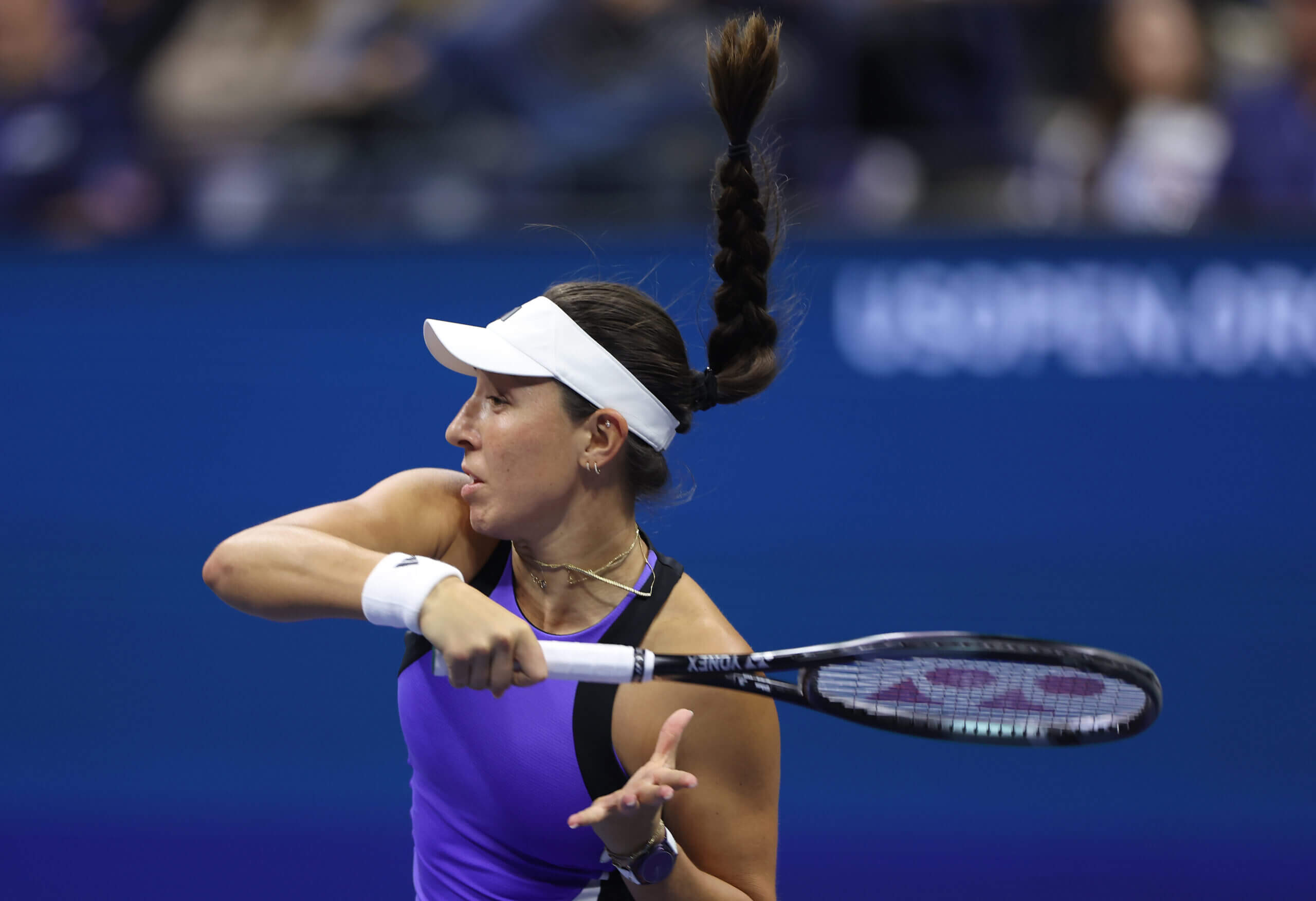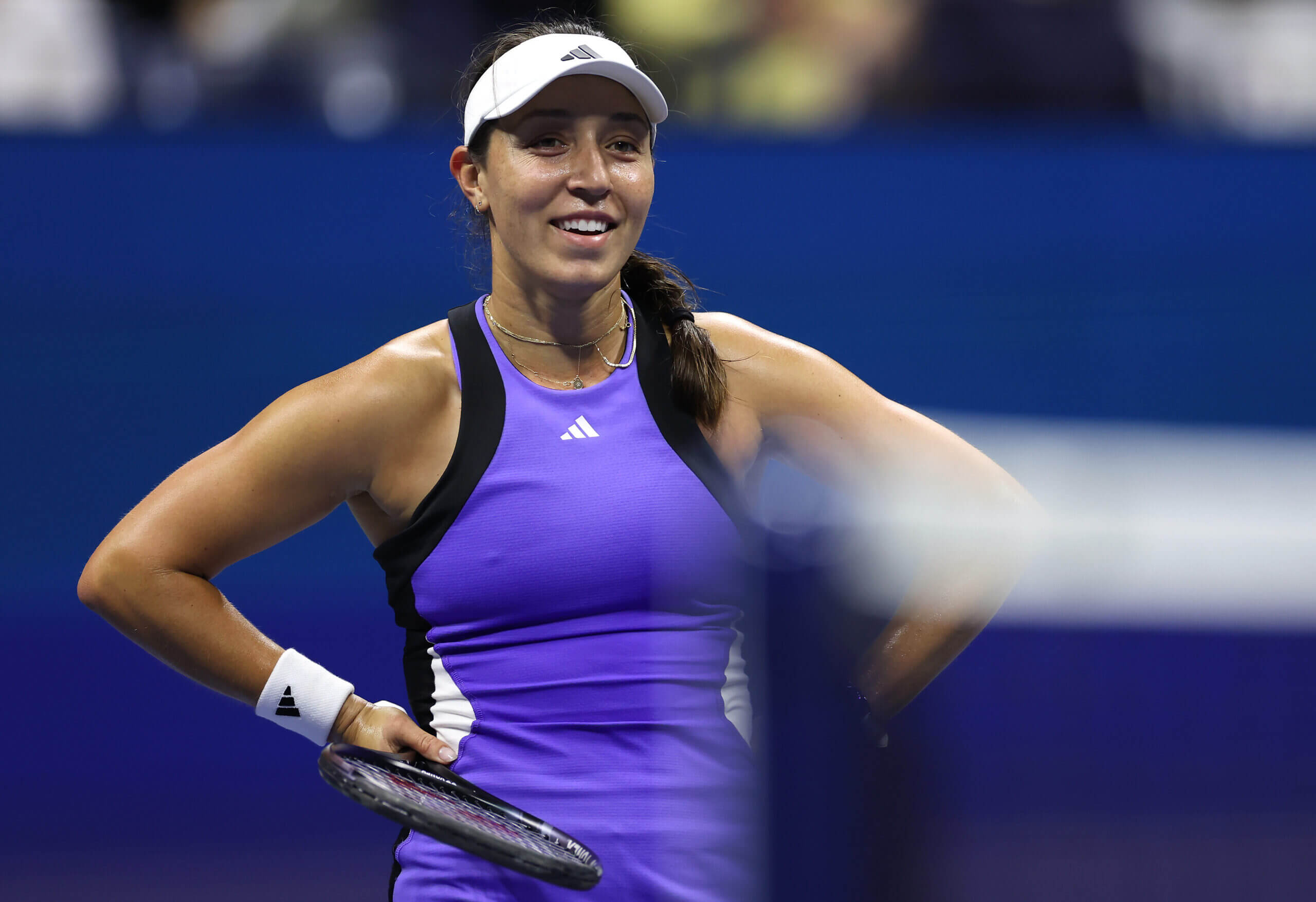
There will be an American in both of the weekend’s U.S. Open finals, after Jessica Pegula fought back to defeat Karolina Muchova 1-6, 6-4, 6-2.
When down a set and a break, the idea of Pegula extending home interest in the women’s draw felt fanciful, but she showed a lot of heart to turn the match around, against an opponent who eventually ran out of steam. Muchova was only recently returning from almost 10 months out with a wrist injury, and had suffered with stomach issues during her win over Beatriz Haddad Maia in the previous round.
Lying in wait for Pegula on Saturday is the No. 2 seed Aryna Sabalenka, who took out the other American semifinalist, Emma Navarro, earlier in the night. With one of Frances Tiafoe or Taylor Fritz lining up in Sunday’s men’s final, it promises to be a bumper weekend for American tennis — the first time since 2002 there’s been a home player in both finals — and an opportunity for Pegula to achieve a lifetime dream at age 30.

Jessica Pegula is into a first Grand Slam final. (Luke Hales / Getty Images)
She could smile disbelievingly at that prospect at the end of the match, but the jubilant scenes after the final point felt a long way off at the start. There was a flat atmosphere at Arthur Ashe Stadium during the early exchanges. Many of the fans in attendance were probably recovering after the excitement at the end of Sabalenka’s win over Navarro in the first semifinal, and the more subdued atmosphere suited Muchova better than Pegula.
The Czech was able to execute her unrivaled variety without having to worry about external factors, while Pegula came out, in her own words, “super flat.” She said afterwards that she may have been feeling the effects of her win over Iga Swiatek just 24 hours earlier, and having thought she was relaxed about playing her first major semifinal, ended up being “a little too loose.”
After saving three break points in the third game, Muchova took over the first set, in large part thanks to her devastating volleying, which players on the WTA Tour rarely have to deal with. Likewise the slice, which Muchova employed with similar success. As she scampered along the baseline, Pegula invariably found herself having to hit up on the ball, and there was the waiting Muchova ready to flick away a volley.
Underlining the contrast between the two players, Pegula belatedly tried a similar tactic. Except when she did it, she hit her volley from an awkward position and it ended up in the bottom of the net to send Muchova up 5-1. Five points later the set was gone, in less than 30 minutes. “She made me look like a beginner, I was about to burst into tears,” Pegula said on court after her victory.

Karolina Muchova put Jessica Pegula to the sword in the first set. (Charly Triballeau / AFP via Getty Images)
This was what Pegula must have been fearing. When she’s confident, Muchova gets into a sort of flow state in which everything looks effortless. Emboldened by a decisive lead, she can go through her full repertoire of shots. A drop shot helped her to a break in the first game of the second set, and she skipped to the chair to change ends.
Pegula trudged. This was getting awkward. Her win against Swiatek was her first in a Grand Slam quarterfinal in her seventh attempt, but this schooling didn’t feel like much of a reward.
Even when Muchova missed a shot, she looked excited to try again on the next point — like an inventor constantly coming up with new ideas. She looked like she was having a hitting practice; Pegula looked as though she was in a bad dream.
“I felt like I played in flow, like everything was going in the court,” Muchova said of this period of the match. “Also, I felt like she was a little nervous. It was actually going kind of easy, and I knew that it’s not going to go like that all the time.”

Jessica Pegula struggled to get into the match until the fourth game of the second set. (Scott Wenig / Associated Press)
The No. 6 seed desperately needed a moment to get herself and the crowd going. It arrived in the third game of the set, when, facing break point, she stretched for a forehand slice and did enough with it to draw a missed volley from her opponent.
“That was lucky,” Pegula said afterwards, later describing it as “a big momentum swing.” “I felt like it changed (after that) and she picked up,” was Muchova’s take on the match’s clear turning point. It was the first point that Muchova had lost at the net all night, having won all of the previous nine.
Pegula then clung on for 2-1, and broke Muchova’s serve for the first time in the next game, defending well again and finally getting some joy when the Czech was at the net.
Another break point came and went in the next game for Muchova, and Pegula, largely through her force of will, had won three straight games to go up 3-2.
Whether Muchova was dwelling on that missed volley for 3-0, or suffering from a lack of match fitness so early in her comeback from wrist surgery, her level was dropping just as Pegula was raising hers. Pegula broke again, thanks to a brilliant inside-in forehand winner and then a clean strike on the backhand side. She was getting much better depth on her lobs as well, forcing Muchova to hit increasingly awkward smashes. Pegula even sent one floating clean over Muchova’s head and onto the baseline in the next game.
Muchova won seven of seven points at the net in the first set; that ratio went down to 11 out of 19 in the second.
Jessica Pegula's path to the final
| Round | Opponent | Nationality | Result |
|---|---|---|---|
| SF | Karolina Muchova | Czech Republic | 1-6, 6-4, 6-2 |
| QF | Iga Swiatek | Poland | 6-2, 6-4 |
| R16 | Diana Shnaider | Russia | 6-4, 6-2 |
| R32 | Jessica Bouzas Maneiro | Spain | 6-3, 6-3 |
| R64 | Sofia Kenin | USA | 7-6(4), 6-3 |
| R128 | Shelby Rogers | USA | 6-4, 6-3 |
Although Pegula was immediately broken back, Muchova’s rhythm had gone. She wasn’t flowing anymore, her strokes suddenly not quite as natural. Pegula sensed it and started stepping in on her returns. After double-faulting when down set point at 5-4, Muchova immediately left the court, explaining afterwards that she did so to change her clothes, rather than because of a specific fitness issue.
It was the first set she’d dropped all tournament.
The early signs in the third set weren’t encouraging for her. Muchova was spraying forehands, and it felt as though the match was now Pegula’s to lose. She held serve to lead on the scoreboard for the first time in the match, and duly broke for 2-0. Muchova, perhaps wary of Pegula’s improved defence, perhaps not feeling physically able, was making fewer darts towards the net. That was good news for the American, who fended off a break point and held for 3-0.

Jessica Pegula turned around a match that looked lost, as Karolina Muchova’s level dropped. (Sarah Stier / Getty Images)
Muchova could have folded at this point, but showed hugely impressive resolve to keep fighting. Down 3-1, 40-30, she produced two of the most astonishing defensive points ever seen on this court. The second one ended with a flicked single-handed backhand pass, bringing up a break point.
When Pegula saved that point, it felt like a key battle had been won.
Ditto the American’s next service game, which she won at the sixth attempt after a series of thrilling exchanges. The crowd were fully into it now, roaring their encouragement as Pegula moved to with a game of the final. Muchova meanwhile showed that she even vents her frustration artistically, chucking her racket high into the New York night and catching it like a circus performer.
Two tired errors from Muchova, one missed overhead and another slice — the hallmarks of her thrilling first set — signalled the beginning of the end. At 0-40, on a second serve, Muchova nicked a point, but another slice went wide and Pegula’s arms were aloft.
“It’s a childhood dream,” Pegula said of reaching a first U.S. Open final. “It’s what I wanted when I was a kid.” And after a tough first half of the year that included two months out because of injury, she could scarcely believe the scale of her achievement.
“If you would have told me at the beginning of the year I’d be in the finals of the U.S. Open, I would have laughed so hard. I was not thinking that I would be here.
“To be able to overcome all those challenges, say that I get a chance at the title Saturday… It’s what we play for as players. Let alone in my home country, in my home Slam. It’s perfect, really.”
After smashing through her personal quarterfinal ceiling on Wednesday night, Saturday and a possible place in history awaits.
